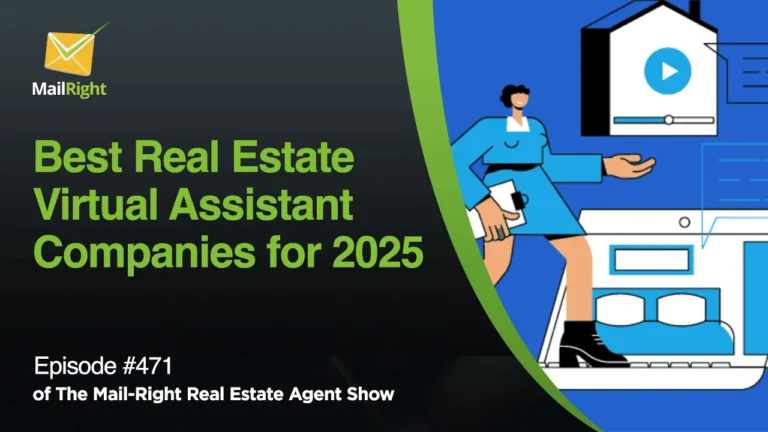On the 397th episode of Mail-Right Show, Robert Newnan, and Jonathan Denwood discuss why real estate agents fail with Facebook ads in 2023 and explore the reasons and some tips to successfully generate results from your advertising efforts on Facebook. Robert Newman has worked in the real estate SEO business for over a decade and is CEO of Inbound REM, an inbound marketing firm. Meanwhile, Jonathan Denwood is Mail Right’s joint founder and CEO, providing a WordPress website with a lead generation platform and CRM, all combined at a reasonable price.
1. Choose the Right Objective
Depending on what market you’re in, you should be either looking at leads or traffic. Leads are the best, but it depends on what area you’re competing in. Now, it will get you traffic, but it will not be focused. Traffic is a broader term for the people they will send to your landing page or website; although cheaper, it might not bring real leads.
Now, there’s a common mistake many make. They see an option to “boost a post” on social media and think getting attention is easy. However, this often wastes your money. While it might increase the number of people who see your post, it only sometimes leads to meaningful engagement or actual leads. So, focusing on targeted traffic is essential for better results and not being tempted by the easy but less effective option of boosting posts.
Note that Facebook is not the most friendly interface if you use Ad Manager because if you do pay campaigns, you must set that up. You should go through some steps to protect yourself because if you’ve done any Facebook advertising for any consistent time, it’s very likely your account will be suspended. There are occasions when your account can be blocked forever. So, you need to set up another account and know how to set up your Google ad manager in a way that will cover your backside.
2. Ending your campaigns much too soon and with a small budget
How long do you keep the campaign running, and what budget is recommended?
Well, your budget depends on the area you are competing in. If you’re in a smaller city or semi-rural area with a population of around a quarter to half a million, the budget can vary based on how hot the local real estate market is. For example, if you’re in a city of half a million in Southern California, it’s a very different market compared to the Midwest.
Generally, the budget required for real estate advertising has increased over the past 2-3 years. This is why getting results for just $5 or $10 a day has become popular, but it can be unrealistic depending on the market.
When you advertise on platforms like Facebook, you must understand that it takes time for them to evaluate your campaign. They assess factors like the quality of your campaign, the visuals (graphics or videos) you’re using, the landing page you’re directing people to, and various other parameters. This evaluation process usually takes at least a week before they send traffic to your advertisement. So, a realistic budget and timeline are essential when planning your real estate advertising strategy.
Advertisement has a natural lifespan and don’t last forever. Therefore, it’s finding that sweet spot where you’re giving Facebook enough time to make a judgment call, but you’re staying on it because the advertisement will exhaust itself naturally. But for most people, when it comes to budget, between $300 and $500 for an advertisement campaign per month is a good starting point. Then try and see if you’re getting results, and then if you can put anything between five and a thousand in afterward as you’re getting some results, it is probably a realistic place. Depending on the area, you can put 100 in and get some results with 250 a month, but that won’t work if you’re in a huge metropolitan area.
3. Use your warm and semi-warm list management on Facebook
If you have a list of emails and names and can put them into your Facebook ad account and retarget to that list, it will cost you much less. This is especially true in competitive urban areas. Not only do they retarget to those, but they retarget to people similar to the list you import. If the list you’ve built up is geo-focused, and over the last few years, your ability to geo-target utilizing Facebook has decreased dramatically due to government intervention and other factors. But if the list you’re importing is geo-focused, they will take that list and retarget to similar people.
There are also some things that Facebook has done incredibly well that marketers would be fools not to be involved with. One revolves around remarketing and retargeting using a Facebook pixel on a website or some other service. That means once you direct somebody someplace, your advertisement follows them around on Facebook and Instagram.
When it comes to having and maintaining a list, the effort you make with the 10,000 leads you’ve never done anything with is a vital conversation. It’s not just about email. Can you get up in front of these people quietly and silently and put an ad in front of them that cost you almost nothing?
Display advertising on these services is very inexpensive, even click-through advertising. You’re not going to be spending as much as you think you’re going to be spending because not a lot of people are going to click. But that doesn’t matter so much because many people already know you. So they have your contact information, they have your phone number. They may not click on your ad, but when they think of real estate, you come to the top of their minds, which is the whole point of advertising.
4. The call to action is not optimized correctly
Any business requires experimentation. Your model is going to require experimentation. One recommended thing to do is pick a couple of territories to sell real estate. Get an email address. Once you have collected emails, give them high-value content, and don’t ask them to buy anything. You must get the names and numbers of everyone on your farm, just like always in the real estate business. You can knock on their door or digitally advertise to them, send them mail, and have somebody else knock on their door. Doing a blended media strategy, trying a little bit of all those things, and seeing which works for you is recommended.
Furthermore, instead of making awkward calls or sending emails saying, “I really want to talk to you,” for introductions, consider a more effective approach. You can start the conversation by emailing a digital appraisal of their home. It only takes about 10 minutes and provides valuable information about what similar homes in the area have sold for. This information is highly valuable if they plan to sell their home in the next 3-5 years. You want them to open your email and begin building a relationship. If you repeat this process with everyone in your target market for whom you have an email address, you can establish a strong presence in that market.
Furthermore, there is a situation where you can choose not to click the chat box connected to being in a particular category. There was concern about how minorities were excluded, some of which was overplayed. For instance, if you’re placed on average, you’re supposed to click a tick box that you’re one of these particular industries, and there are restrictions on the advertisement and its scope. A lot of agents choose to avoid clicking the tick box. It is understandable, though, because if Facebook finds out, your account will get suspended, or you’ll lose it, so it would be suggested not to do that.
5. Not using video in advertisements
If you want to reduce the cost, have more people click your advertisement and reach more of its attended audience at a lower price, utilize video. You’ll get three times the amount of clicks than an image with text. Although the text is still important, you will get many more responses from the video.
Some techniques and services enable you to produce videos that are still reasonably engaging and will get results without you having to be in the video. Video technology for A.I. is moving in a good direction, and you should be looking at that because it will make an enormous difference to the effectiveness of your campaigns.
The skill that people need to be focusing on is becoming great storytellers and understanding what their audience wants to hear. For real estate agents, it is a lifestyle. Other than lifestyle are property, prices, and market reports, but they should be a small part of your content marketing effort, including on Facebook. Great real estate agents tie in their marketing with lifestyle elements — great restaurants, stadiums, distance from X, commute to cit Y, schools, and parks are some of the things you can mention in your video that is detail-oriented, spoken from a local perspective.
When somebody says, what should I talk about? They’re actually saying, how would I say something people are searching for? And to answer that, here’s an example. Five hundred people a month search for dog-friendly restaurants in Cabo San Lucas. On that specific search, you don’t know until you research it, you don’t know what people are searching for online, and the answer might shock you in terms of what people search for, such as people who are moving to Texas, off-time search for tax rate and gun law. So if either of those two things is your sub-interest, if you’re a card-carrying member of the NRA and you happen to live in Houston, talk about it. You will be surprised how many people will tune into that, especially since many realtors will be scared to talk about gun rights because Texas is getting more liberal.
If you plant your flag in a field that you firmly believe in that nobody else is talking about, I promise you’ll get a lot of attention, eventually leading to calls. And if you’re half a salesperson, eventually, that will lead to deals.
6. No consistent digital follow-through
Suppose you have no system or follow-through, like Real Geek, Sierra Interactive, or MailRight, which sends follow-through email text messaging and puts them in a quality email newsletter. In that case, you’re missing out on a valuable strategy. Investing time and money is crucial in providing your leads with something useful.
Moreover, it would help if you considered tailoring your approach for each lead because these people are at different timelines of the buying cycle. They might be three, six, nine, and 18 months out. You have to keep in contact with them. But if you don’t understand that and compare it to face-to-face leads, you’ll get pissed off and frustrated pretty rapidly.
There’s a significant movement happening with technology playing a more prominent role in our daily routines. There’s skepticism about relying solely on AI (Artificial Intelligence). However, it’s noteworthy that new tools like Pipeline ROI, among others, are cleverly adding AI into a fairly seamless follow-up process. While some may think AI can replace tasks performed by a $5 per-hour virtual assistant (VA), there are opportunities to make human processes more efficient. But let’s consider a scenario: You’re just starting as a real estate agent, and your budget is tight. In this case, AI can be a valuable resource. You don’t need to become an AI expert for this. With a few months of learning about chat prompts, setting up your email, and understanding webhooks, you can create an automated response system for every person you contact.
But note that automating things or using programmed responses isn’t new inside marketing. It has always been a dream for marketers. It used just to be that somebody would sell you their scripts. People would sell you a book or a unique script for knocking on doors. They’d call it the “magic script,” if you followed it or learned the “magic 12 rebuttals,” success was supposed to follow. Over the years, there’s always been talk of a “magic” technique or method. Nowadays, the trend is more like, “Let us do everything for you.” They claim they can even create a virtual spokesperson who can look at your 159 videos, create automation that connects to ChatGPT, and then talk about online marketing for you.
If you’re desperate and need a quick solution, using automated digital response tools is worth considering. These tools can help streamline your responses. While they’re not a perfect solution, they can still generate valuable deals. However, it’s essential not to rely solely on these tools. Instead, you should find a way to involve yourself in the process.
Usually, when someone does a specific type of Google search, they’re at a different point in their buying journey. As for Facebook leads, they’re sometimes in various stages, but usually, they’re closer to making a purchase, depending on how well your marketing efforts are thought out. So, you should be aware of this. Because of these differences, you’ll be dealing with leads at various stages of the sales process, and you should respond to them differently right from the start. When you’re getting many leads and still managing your regular workload, you can only reach out to these people occasionally. That’s why you need a platform to help you.
However, the initial goal is to start a conversation and send them valuable information through text or an automated email sequence after the initial contact. After that, these leads should go on a list where they continue to receive helpful content until they either respond or choose to unsubscribe. But tracking how long they’ve been on your list and whether they’re still engaging with your content is also essential. If you have their phone number, it’s a good idea to call them for a personal conversation. It’s not about choosing one; successful agents can blend technology with a personal touch.





